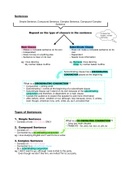Sentences
Simple Sentence, Compound Sentence, Complex Sentence, Compound-Complex
Sentence
Depend on the type of clause/s in the sentence A Clause has
subject, number
and tense
Main Clause Subordinate Clause
~ Makes a complete sentence on its own ~ Does not make a complete sentence on its
~ Independant own
~ Does not rely on anything else ~ Dependent
~ Sentence is clear on its own ~ Needs more information
eg. I love dancing eg. Because I love dancing
My mother bakes mu ns While my mother bakes mu ns
Subordinating clause has a subordinating
conjunction placed at the beginning
What is a subordinating conjunction??
• Conjunction = joining word
• Subordinating = comes at the beginning of a subordinate clause
• Subordinate clause can’t stand on its own because of the subordinating
conjunction and therefore, is dependent on a main clause
• Causes the audience to expect the speaker to add more information
• after, before, when, whether or not, although, lest, because, since, if, unless,
even though, wherever, how, until, while, as, as if, provided that
Types of Sentences:
1. Simple Sentence
- Consists of one main clause ONLY What is a co-ordinating conjunction??
• Joins two main clauses
• FANBOYS - for, and, nor, but, or, yet, so
2. Compound Sentence
- Consists of two main clauses
- Connected by a co-ordinating conjunction
eg. I love studying English and I want to be a writer.
3. Complex Sentence
- Consists of one main clause
- Connected to a subordinate clause
- By a subordinating conjunction
eg. I didn’t want to go, although I was invited to the party.
Even though we don’t like him, we invited Tim to our party.
ffi ffi




